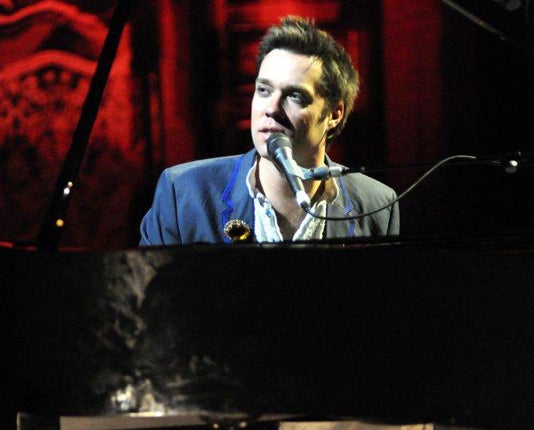Rufus Wainwright, Sadler's Wells, London

At the start of the second half of this extraordinary concert, Rufus Wainwright laughingly confessed that he had been "shitting bricks" over his performance in the first half. No wonder. Before the interval he had treated us to a stunning rendition of his new album, All Days Are Nights: Songs for Lulu, presented as a kind of Beckettian monodrama. An official had requested that we did not applaud the separate numbers, that we should hold back until the very end "as the exit is part of the performance". So was the entrance, and then some.
Wearing a mourning coat with a huge train, Wainwright processed slowly – as though himself a spectral revenant – to a baby grand under lighting that turned the occasion into a kind of black-and-white movie. On a huge screen behind him, cued to the shifting emotions in the songs, his right eye, covered in oil and filmed in massive close-up, opened and closed, sometimes looking like an arachnid creature, sometimes gazing out at the audience with a stoically unflinching regard. At times, the occasion the occasion felt like a surreal cross between, say, Berlioz's Nuits d'été and Beckett's Not I.
Oh yes, it skirted absurdity all right – and then persuasively surmounted all suspicion of it. The new album struck me as a masterpiece when I first heard the CD and I was more convinced of that than ever after this impassioned and intellectually alert performance.
Some of the songs may have been written as a way of grieving for Wainwright's mother, the musician Kate McGarrigle, paradoxically while she was still among us. "Skating on the ice of song, about to go under" is a beautiful line from "Zebulon", which brings the cycle to a close. But the point is that neither the song nor its author go under. They survive, thrillingly.
All Days Are Nights has been accused of moping and meandering. People who think that cannot have attended to its variety and abundance, whether in settings of Shakespeare's sonnets that penetrate to the rhetorical and emotional soul of these works or in the rousing, Charles Ives-like way Wainwright makes a piano sound like an entire parade on the wonderfully defiant cocked snook at his critics that is "Give Me What I Want And Give It To Me Now".
Join our commenting forum
Join thought-provoking conversations, follow other Independent readers and see their replies
Comments